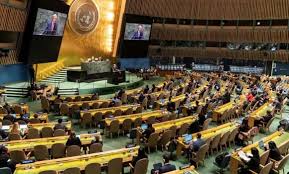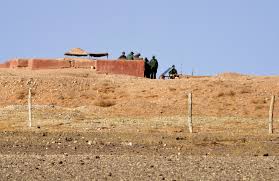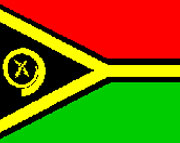On the fourth day of its discussions on decolonization, the Fourth Committee (Special Political and Decolonization) heard on Thursday from 13 additional petitioners on the question of Western Sahara, as Member States also continued their general debate.
Throughout the afternoon meeting, delegates stressed that the decolonization process should be concluded as quickly as possible through the delivery of concrete results.
“Adopting repetitive resolutions without regard to their implementation only gave credence to the perception of powerlessness”, said the representative of Dominica, who gave some examples of innovative measures proposed over the years — including the First and Second International Decades for the Eradication of Colonialism — which had never been implemented, either because of a lack of cooperation by administering Powers or resistance from the United Nations Secretariat.
Also speaking on the question of Western Sahara were: Lorenzo Olarte Cullen, former President of Canary Islands; Mikael Simble, representative of the Norwegian Support Committee for Western Sahara; Marc-Louis Ropivia, Professor of Political Geography, L’Université Omar Bongo de Libreville; Jane Bahaijoub, Family Protection; Eric Cameron, World Action for Refugees of Norway; Pedro Pinto Leite, International Platform of Jurists for East Timor; Juan Soroeta Liceras, Public International Law Professor, Universidad del País Vasco/Euskal Herriko Unibertsitatea; Jose Luis Jimenez; Francesco Bastagli, former Special Representative of the Secretary-General in Western Sahara; Diallo Babacar, Centre d’études diplomatiques et strategie of Dakar; Anja Oksalampi, Yaakarre-REDHRIC; and Gilonne d’Origny.
———————————-
The Fourth Committee will conclude its consideration of decolonization issues at 3 p.m., Friday, 10 October. It is expected to take action on several decolonization-related texts.
The Fourth Committee (Special Political and Decolonization) met on Thursday afternoon to continue its consideration on all decolonization issues. It was expected to hear the remaining petitioners on the questions of Western Sahara and New Caledonia, and to hold a general debate among delegations. (Reports before the Committee are summarized in Monday’s Press Release GA/SPD/396.)
Petitioners on Western Sahara
MIKAEL SIMBLE:
Representative of the Norwegian Support Committee for Western Sahara, appealed to the Committee for the United Nations to bring to an end to Morocco’s continued presence in the Western Sahara, the commerce and industry exploiting the region, and the violation of human rights of those who opposed the current system. For the United Nations not to respond would “threaten the peace and stability of the […] Maghreb region and undermine the ability and credibility of the United Nations as an arbiter in international conflicts”.
He noted the many breaches of United Nations rulings, opinions and resolutions confirming the status of Western Sahara as a Non-Self-Governing Territory by Morocco and international companies doing business in the area with Morocco. He also noted peaceful protesting Saharawis that continued to be arrested, tortured, as well as disappeared.
He went on to stress that the Saharawi activists were, in fact, “doing the work of the United Nations” as they were promoting the Organization’s resolutions regarding self-government and the protection of basic human rights. The founding principles of the United Nations insisted that the international community hold Morocco and its many business partners accountable for their illegal and unethical actions.
PEDRO PINTO LEITE:
International Platform of Jurists for East Timor, said Morocco continued to defy Security Council and General Assembly resolutions and to violate international law — which was very clear on Western Sahara — with total impunity. Among the obligations and prohibitions under the international legal norm of “jus cogens” that Morocco was violating were the obligation not to obstruct the right of a colonized people to self-determination; the prohibition of the use of aggressive armed forces; and the obligation to refrain from torture and other cruel treatment.
He said that the occupation of Western Sahara and the exploitation of its natural resources were unlawful, and a free and fair referendum there, according to the original peace plan of the United Nations and the Organization of African Union (OAU), would be the only legal and real solution to the problem.
Yet, the Moroccan regime tried to depict the Saharawi struggle for self-determination as something illegal, sometimes even calling it terrorism, he said. That “ridiculous accusation” was at odds with the fact that past armed resistance to Moroccan aggression was lawful self-defence. The Saharawis had also scrupulously adhered to the ceasefire adopted in 1991, even though the referendum that was part of that plan had never taken place.
He called for an inquiry into the crimes committed in the occupied territory, saying that Morocco’s suggestion to establish an ad hoc tribunal was “clearly a bluff” given how that country had obstructed the publication of the 2006 report of the Office of the United Nations High Commissioner for Human Rights and the expansion of the mandate of the United Nations Mission for the Referendum in Western Sahara (MINURSO) to include human rights.
He further said that Spain would have to recognize the Saharawi Arab Democratic Republic if it wanted to effectively give up its position as administering Power in Western Sahara. If the Fourth Committee or any other United Nations organ endorsed the “absurd” statement of Peter van Walsum, the Secretary-General’s former Personal Envoy for Western Sahara — that law was on the side of the Saharawis, but political realities were not — what would be the significance of the Second International Decade for the Eradication of Colonialism and of the Committee itself? he asked.
JUAN SOROETA LICERAS:
Public International Law Professor, Universidad del País Vasco/Euskal Herriko Unibertsitatea, stressed that Morocco was not the administering but the occupying Power in Western Sahara. As such, it was illegally exploiting the Territory’s natural resources and stood in permanent violation of humanitarian law. Only by the exercise of the Saharawi people’s right to self-determination would the conflict be ended.
Saying that little remained of past agreements between the relevant parties, he noted that the 18-year-old peace process showed two things. First, no trace of the initial consensual agreement between the parties remained and Morocco had used the peace plan to gain ground and deny the possibility of a referendum. Second, neither the voluntary abandonment of arms nor the tireless negotiating patience of the POLISARIO Front and trust of the United Nations had been of any use.

Turning to the possibility of further negotiations, he said the proposal of the Secretary-General’s past Personal Envoy of an autonomy regime with the Moroccan territory clearly did not hold up to international legal scrutiny. He wondered if, in light of that proposal, the Saharawis could still trust the international community since international law would no longer protect them if they accepted the autonomy process. But beyond that, if they returned to their land as a province of Morocco, their resistance would increase. The current situation could not continue indefinitely, however, and the only possible conclusion was through the decision of the Saharawi people by a self-determination referendum.
JAVIER P. MORILLAS GOMEZ:
Adviser on Employment Oversight for the Community of Madrid and Coordinator of the World Economic Program at the University of San Pablo-CEU, said one of his office’s main concerns was irregular immigration to Spain resulting from the adverse economic situation in northern Africa. Those undocumented immigrants, who left the Maghreb piled into fragile boats, were a consequence of the frustration and poverty provoked by Morocco’s costly occupation of Western Sahara. That cost, as opposed to investment, fostered the region’s underdevelopment.
Capital investments could generate a dynamic and progressive development, but today’s policies only generated misery and growing social discontent across the Maghreb, he said. In August, the Mauritanian Government had been toppled in a coup d’état. The “Salafista for Preaching and Combat” had morphed into “Al-Qaeda of the Islamic Maghreb” and was extending its tentacles into Chad and Mali. An arsenal of arms had been found in Morocco and fighters in northern Morocco were becoming ever more rebellious against the Sultan. Meanwhile, cannabis production was increasing. Drug traffickers were expanding their operations, using violence to get their way, and opening new and more direct routes between Africa and the European Union.
That complicated situation required a new vision that would take into account the problems caused by Morocco, he said. It should particularly address the risk of generating a “narco-terrorist” alliance. “Is the international community ready to keep on postponing the decolonization of the Sahara for Morocco to consolidate the narcotic-terrorist alliance […] that the illegal occupation of the Sahara generates?” he asked.
GILONNE D’ORIGNY:
Lawyer, said that no one should be here today. Human rights defenders, like Robert Kennedy Human Rights Award recipient Aminatou Haidar, who had delivered an intervention yesterday, should not be here. But she must, because while she should be living in her homeland free from oppression and a citizen of a State she and her Saharawi brothers and sisters had freely chosen to represent them, she could not.
“The law is simple […] and if it is followed, the door on Africa’s colonial past can be closed”, she said. However, Spain had tried to abandon the Territory and the Saharawi people in 1975. Morocco’s subsequent invasion and the “flagrant blind-eye” Spain had trained on this invasion violated the International Court of Justice’s opinion that affirmed that Morocco’s claim of sovereignty over Western Sahara was groundless. If that advisory opinion, as well as the fundamental human right to self-determination, had been applied, the question of Western Sahara would not be asked today.
Indeed, Morocco had bullied the world into believing that it should be part of a Saharawi vote for self-determination, she said. Yet, Morocco had continually interfered with the work of the United Nations Mission for the Referendum in Western Sahara (MINURSO). Although it had initially agreed that a referendum should take place, it had attempted to inflate the vote with Moroccans posing as Saharawi. When that did not work, Morocco had consistently refused any negotiation that would include independence as an option, she said.
Morocco was now trying to impose an autonomy plan even though it was an illegal occupier, a thief of Western Sahara’s natural resources and a violator of Saharawi human rights. In that context, she welcomed the anticipated appointment of Christopher Ross as new representative of the Secretary-General, wishing him well on his work to remove this Territory from the list of Non-Self-Governing Territories.





